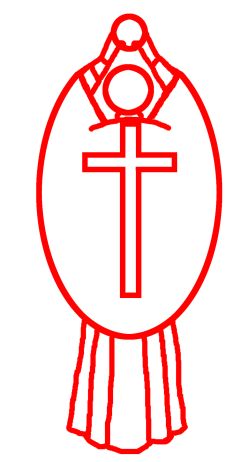
4 minute read
In the footsteps of the martyrs
This issue of Mass of Ages seems like an appropriate opportunity to note that next year, 2025, will be the Latin Mass Society’s 60th anniversary: our diamond jubilee.
Our plans for the year are not complete, but we hope to do some special things to mark it: the celebration of Mass with special solemnity, some special publications, and a conference in June with especially distinguished speakers.
The Society might be said to have been founded several times over, inasmuch as independent initiatives with the same objectives were rolled into one in early 1965. In October 1964, Geoffrey Houghton-Brown placed an advertisement in The Times to gather support for an ‘appeal’ to retain the Latin Mass (major changes to the text and rites were not yet anticipated by anyone except Vatican insiders), gaining 1,500 names. He only then discovered that Miss Gillian Edwards and Miss Ruth McQuillan, both of Cambridge, were already organising a petition for Cardinal Heenan with 3,446 signatories, having placed an advert in The Tablet.
In November, Mrs Cathleen Hindmarsh of Manchester republished a version of Houghton-Brown’s appeal in The Guardian, gaining another 3,000 names. Then, in January 1965, Hugh Byrne got a letter published in The Catholic Herald soliciting expressions of interest in a ‘Latin Mass Society’, and arranged an inaugural meeting.
All these individuals, two men and three women, were, so far as I have been able to ascertain, simply strongly motivated lay Catholics: none were public figures, activists, scholars or writers. They found themselves part of a movement which was spontaneous, world-wide, and truly grass-roots, and all ended up involved in the fledgling LMS.
Throughout the history of the Latin Mass Society there have been attempts to portray us as trouble-makers: if only we would stop making a fuss, then ordinary Catholics would settle down to the reformed Mass and everything would be fine. The reality, however, is that we are ordinary Catholics, and the fuss we make is a fuss made by ordinary Catholics. Back in 1965 not everyone was happy to see the Church’s ancient liturgy lost forever. This is still true today, and will continue to be true, I dare say, until Christ returns to right all wrongs. This is a perfectly healthy instinct for an ordinary Catholic to have.
Our predecessors organised petitions and appeals, and then organised themselves into a national Society, because their voices as individual, ordinary Catholics were not being heard. For every person who signed a letter or joined the Latin Mass Society, there must have been dozens who agreed with our aims but were too demoralised to get involved. The Cambridge petition noted that, ‘most of the Catholic press ignored the Petition. Some who wished to sign were discouraged or even forbidden by their priests’.
It is above all to honour these men and women, and to uphold their values and aspirations, that we should mark the Society’s anniversaries. They followed in the footsteps of the English and Welsh martyrs who underwent every kind of suffering - the loss of status, the loss of friends, the loss of property, the loss of liberty and finally the loss of life itself - for this Mass, for the priests who celebrated it and the souls who benefitted from it.
In the great crisis of the Protestant Reformation, when so many were quietly or even noisily going along with something that had been regarded as unthinkable just a few years earlier, the martyrs stood up for what they believed in.
Evelyn Waugh’s biographer Christopher Sykes noted a similar volteface of elite opinion in 1966: ‘Were they [the clergy] consciously talking nonsense all those years, or are they really sincere in their criticisms (which sometimes amount to denigrations) [of the Traditional Mass] today?’
The dangers our predecessors faced were not as great, certainly, as in the 16th century, but in one way the psychological challenge they overcame was even greater: to stand up, on behalf of Holy Mother Church, to defend something that the Church’s own bishops and priests, even the Pope himself, seemed to be seeking to destroy. The temptation to do nothing, perhaps to numb the pain by ceasing to attend Mass altogether, was powerful, and many succumbed to it. But not our founders. As Chesterton wrote, in For a War Memorial:
A storm stooped on the place of tombs With bolts to blast and rive; But these be names of many men The lightning found alive.
Please pray for Hugh Byrne, Gillian Edwards, Ruth McQuillan, Geoffrey Houghton-Brown, and Catherine Hindmarsh, and all the early members of the Society. We may be assured that, when each of them (God willing) enters God’s presence, they will pray for us.











